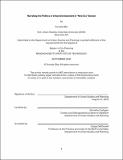Narrating the Politics of Urban Development in “New Era” Boston
Author(s)
Diby, Somala
DownloadThesis PDF (852.0Kb)
Advisor
Cadogan, Garnette
Terms of use
Metadata
Show full item recordAbstract
Since 1950, urban governance in the city of Boston has been predicated on the close collaboration between the city’s economic and political elite, anchored in the Boston Planning and Development Agency (BPDA). A common narrative in Boston is that this “growth coalition” has historically achieved much by way of downtown redevelopment, and much less by way of an equitable housing market. However, with the COVID-19 pandemic, mass mobilizations for racial justice, a progressive turn within the City Council, and the inauguration of the city’s first Black and first woman mayor, recent public discourse reflects a new optimism that the city’s most powerful institutions can be transformed to support a more equitable housing market. This media thesis uses podcasting as a tool to investigate how key actors in Boston’s urban development landscape—from city councillors and administrators, to private developers, and housing justice organizers—believe this unique political moment will shape the city’s land development practices and influence urban governance in the future. I ground this exploration in the recent passage of the Affirmatively Furthering Fair Housing (AFFH) Zoning Amendment, a unique zoning tool designed to assess and address the risk that new development projects will displace nearby residents and reinforce patterns of segregation. Through five twenty-to-thirty-minute episodes, this podcast curates five threads of collective narrative that emerged across 18 semi-structured interviews. Stories are grounded in the theoretical literature of “New Urban Politics” scholars, Boston’s extensive history of urban governance dating back to 1950, and a contemporary framing of uneven urban development in Boston as a cultural challenge as much as a political and economic one. In prioritizing narrative and storytelling over traditional research methods, I advocate for the use of podcasting as a tool for planning research and practice.
Date issued
2021-09Department
Massachusetts Institute of Technology. Department of Urban Studies and PlanningPublisher
Massachusetts Institute of Technology